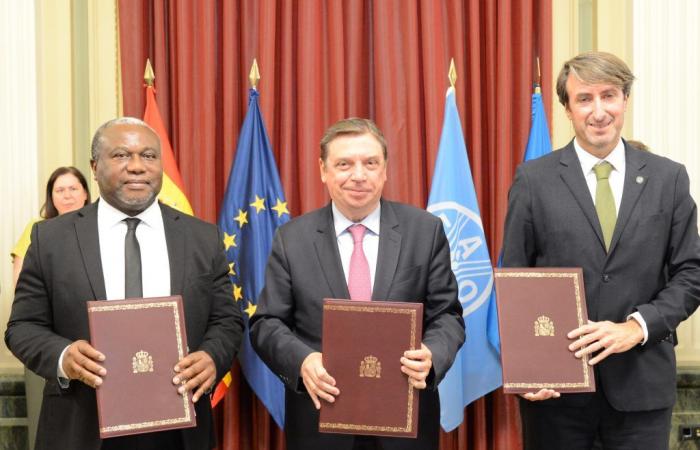The Córdoba olive world germplasm bank, which brings together more than 1,200 varieties of this crop from 29 countries, has adhered to what is known as the international seed treaty to ensure the conservation and fair distribution of these resources.
The Minister of Agriculture, Fisheries and Food, Luis Planas, signed the accession agreement this Friday in Madrid together with the secretary of the treaty, Kent Nnadozie, and the executive director of the International Olive Council (IOC), Jaime Lillo.
Spain thus incorporates the varietal collection conserved in Córdoba to the international network of gene banks recognized by the treaty on plant genetic resources for food and agriculture, whose governing body is the UN Food and Agriculture Organization (FAO).
At the event, Planas highlighted the importance of this ancient crop that Mediterranean agriculture wants to share with the rest of the world, promoting new research and innovation projects.
The signed agreement, which reflects “the efforts, shared objectives and excellent international cooperation”, will allow “the creation of new opportunities for cooperation with the network of technical and financial partners of the treaty”, the minister assured.
Planas has highlighted the need to have more resistant crops that require fewer inputs in the face of new demands in food production, such as an improved nutritional profile and a longer shelf life, and the challenges facing global agriculture, such as change climate and “complex” geopolitical scenarios.
That is why it is important to have plant genetic resources with certain characteristics for direct use or in plant improvement programs, or from wild varieties, he pointed out.
In his opinion, the conservation of the diversity of germplasm banks is “essential” to facilitate access to this material for researchers and breeders, as recognized by the FAO treaty, a “key” instrument for their shared sharing. fair and equitable benefits derived from the use of those resources.
The Minister of Agriculture has recognized the historical work of farmers who have made this heritage available to future generations, as well as the sector’s contribution to rural development.
For his part, the secretary of the international treaty has recognized “Spain’s leadership in this area” and the contribution of its knowledge and technical capabilities in order to contribute to global food security.
The executive director of the IOC has pointed out that the international recognition of the Córdoba collection is “a starting point that opens the way to other international projects and a new stage in the management and conservation of plant genetic resources”, and has expressed the wish to take a collection in the future to the largest seed bank in the world located in Svalbard (Norway).
The Minister of Agriculture, Fisheries, Water and Rural Development of Andalusia, Ramón Fernández-Pacheco, has highlighted the relevance of the olive grove for this community, which hosts 80% of the national olive oil production, and has made the project available of the sector, science and research.
The rector of the University of Córdoba, Manuel Torralbo, has shown his commitment to collaboration to meet the terms of the agreement and the objectives set.
The world germplasm bank of Córdoba, national reference center for olive tree varieties, is managed by the Andalusian Institute for Agricultural, Fisheries, Food and Organic Production Research and Training (Ifapa) in collaboration with the University of Córdoba.
It is also part of the international network of gene banks, coordinated by the International Olive Council.






